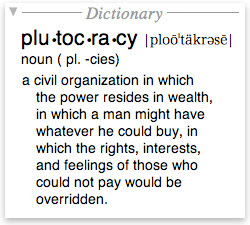

Why does the situation outlined by Fleischhauer arise then? The answer is clear – the media does not do what it claims to. And it provides investigation and examination to ensure that power is checked and decision-makers are held accountable’ (Let us, perhaps without justification, take this as true. It provides criticism and debate to ensure that that information is tested and examined from all points of view. It provides facts to allow us to be better informed about the issues that matter to us.

#Synonym for plutocracy how to#
The truth is, it only works reasonably well if the number of voters who have no idea (or perhaps worse: are convinced they do) are not too big on the day.’ We ask ourselves: how might people have an idea? Surely, the answer is the media, reporting on the facts and showing how to criticise the government, along the lines of Jeremy Browne, the then Foreign Office Minister, set out during a speech in April 2011 in Hanoi : ‘In democracies, the media is fundamental to political life. More recently Jan Fleischhauer wrote in the Guardian (9 April) that: ‘Democracy is overrated anyway. ’ ( First Principles of Government)īoth stalwart classical liberals had, then, a deep scepticism when it came to democracy, and sought ways to restrict it.
#Synonym for plutocracy free#
It is, therefore, on opinion only that government is founded and this maxim extends to the most despotic and most military governments, as well as to the most free and most popular. When we enquire by what means this wonder is effected, we shall find, that, as Force is always on the side of the governed, the governors have nothing to support them but opinion. ‘ Nothing appears more surprising to those who consider human affairs with a philosophical eye, than the easiness with which the many are governed by the few and the implicit submission, with which men resign their own sentiments and passions to those of their rulers. The second was put succinctly by David Hume :

The first was suggested by the radical liberal John Stuart Mill, who suggested in his Thoughts on Parliamentary Reform (1859) that ‘every person should have one vote, but that every well-educated person in the community should have more than one, on a scale corresponding as far as practicable to their amount of education’. The second is to entice the workers into voting against their class interests. The first is to skew the vote against the workers, privileging the elite. How, then, has the ruling class been able to prevent the working class up to now from achieving this goal? There are two obvious possible answers. Socialism’s future lies in class-conscious workers expressing themselves through collective action and the ballot.


 0 kommentar(er)
0 kommentar(er)
